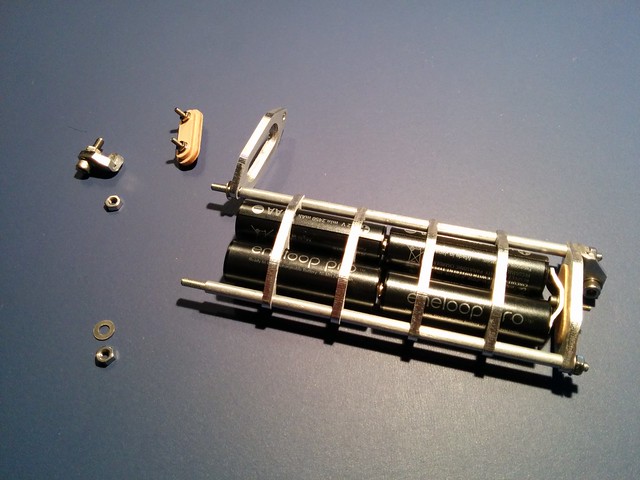Lithium Vs NiMH AA Batteries, Which Is Better
Dec 13, 2019 Pageview:3414
We live in modern society which is powered by numerous electronic devices such as smartphones, digital cameras, flashlights, and laptops. Isn’t, it right? We are surrounded by these devices. In fact, they have become an important part of our lives. All these devices use one thing and it is a battery.
When it comes to the battery world, there are several types available out there and each one features its own pros and cons. For today’s post, we’re going to discuss the Lithium and NiMH batteries. To be more precise, we’re going to compare them to help you determine which one is better to use for your application. So, let’s start….
Does lithium battery Last Longer Than NiMH AA Battery?
The key difference between the lithium-ion and NiMH AA battery is the material utilized to store power. Lithium-based batteries are made of lithium and other elements like carbon. On the other hand, NiMH batteries or nickel-metal hydride batteries utilize hydrogen to store power. Both batteries have gained huge popularity for portable electronic devices. In most electronic devices, both batteries are commonly found. That’s why it is obvious to wonder which one is better.
Which battery lasts longer, lithium-based or NiMH battery? Then, the shortest and simplest answer to the question is the lithium battery. The cycle life of lithium-based batteries is 500 to 1000 whereas NiMH batteries have 300 to 500.
What Are The Advantages Of Lithium and NiMH AA Battery?
Before you use any battery, it’s always good to explore what advantages it has to offer you. This will help you decide whether the battery is the right fit for your application.
The Key advantages of Lithium battery include -
Highly Energetic
Lithium batteries are known for stable, long-lasting and reliable power. They have extremely high energy density as compared to the NiMH battery. Therefore, it also means that they feature high power capacity. Thanks to their high energy density, they can be used in devices that need high power requirements, for instance, mobile phones, laptops, and computers. In short, lithium batteries are capable of carrying more charge/gram as compared to NiMH AA battery.
Size & Weight
Lithium batteries are usually lighter as well as smaller in weight as compared to NiMH batteries. It is a big advantage or benefit that helps its uses in numerous portable consumer electronic devices like smartphones and laptops.
Low Discharge and Quicker Charge Time
Lithium batteries have remarkably lower self-discharge as compared to NiMH batteries. Therefore, you can use them for low-current devices such as watches and clocks. They can easily deal with several charge and discharge cycles. As a result, they feature longer shelf lives. Moreover, these batteries recharge quite much faster as compared to NiMH batteries.
Low Maintenance
As compared to any battery technology, Li-ion batteries don’t need any maintenance to guarantee their performance. Other technologies of battery like NiMH need discharge in order to prevent memory effect.
The Key advantages of NIMH AA battery include -
Safer
NiMH AA batteries have less active materials than Li-ion batteries. They can pop if overcharged or short circuits. But, this is nothing if we compare to Li-ion batteries that can blow up. They are more environmentally friendly as compared to lithium batteries.
Completely Discharge is Possible
By completely discharge means that you can bring them down to zero charge, if it is possible for you to do that. Still, they will charge. One thing you should note that don’t allow them to experience reverse polarity or otherwise you can damage the battery.
Compatibility
NiMH utilizes the standard sizes and that’s why these batteries are compatible with almost every device using size such as AA.
What Are The Limitations Of Lithium and NiMH AA Battery?
Every item has cons and there is no exception when it comes to battery. So, let’s give a quick glance at the limitations of lithium and NiMH AA battery.
The Key limitations of Lithium battery include -
Expensive
Although the cost of the lithium batteries is falling on a constant basis, it is still higher as compared to NiMH AA battery.
Contain High Active Materials
These batteries incorporate extremely high active materials. They can easily react and provide lots of heat. Therefore, there are short circuits in those battery cells.
Can’t be Completely Discharged
If the lithium battery gets fully discharged, then you will damage the battery. That’s why it is always recommended to keep these batteries charged over 50%.
No Standard Size
Unlike NiMH batteries, there is no standard size like AA for lithium batteries.
The Key limitations of NiMH AA battery include -
High Self-discharge Rate
NiMH batteries lose a big portion of their charge on a monthly basis. As compared to lithium batteries, they have quite a high self-discharge rate.
Long Charging Time
Each AA battery cell can only produce 1.2v as compared to lithium-ion batteries that can give 3.7v.
Can’t Work at Extreme Temperature
NiMH batteries at extreme temperatures drop voltage output. On the other hand, lithium batteries can deal with these temperatures or conditions to such an extent.
Not Meant for Low Load Devices
You shouldn’t consider NiMH batteries for low load devices like clocks. These batteries will lose charge quite fast via self-discharge. That’s why lithium battery is recommended.
That’s all on lithium Vs NiMH AA Batteries. Hopefully, you now got a clear idea of which one is better for your application, either lithium technology or NiMH one. Before making a real purchase, have a look at the advantages and limitations of both batteries to decide. Considering all the things discussed here, it is fair to say that lithium batteries are better than NiMH AA batteries. The only major limitation that lithium battery has is cost. That’s why many people turn to NiMH AA battery technology. Well, the rest depends on your specific requirements.
- Prev Article: 18650 Battery Measurements Decipherin
- Next Article: Lithium-Ion Battery Life Cycle Analysis
Leave Message
Hottest Categories
-
Hottest Industry News
-
Latest Industry News














